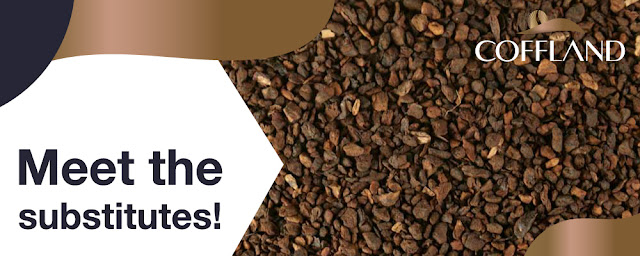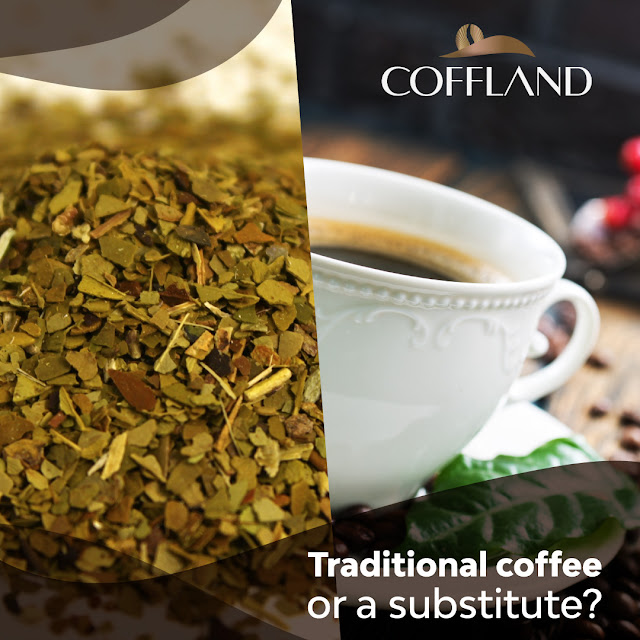 |
| You can try chicory coffee, white coffee, yerba mate and soy coffee. |
In recent years, coffee consumption has increased. Whether it's because the millennials love coffee or because more and more people realize its benefits and great appeal, this beverage remains as an elixir for many. However, even if you don’t believe it’s possible, there are people whose love for coffee or caffeine is minimal, or they simply do not feel love at all. For them today some alternatives could be considered coffee substitutes and, although they are not as incredible as traditional coffee, they deserve recognition for their originality.
Nowadays there are alternatives for everything, but this doesn’t mean that they are good, so if you are going to look for new experiences that include coffee substitutes do not go with the simplest ones, dare to try something different. Thinking about this dilemma, Coffland Corp gives you the opportunity to try some of the best alternatives that exist, just read on to discover them.
Coffee substitutes for the best traditional coffee
White coffee
White coffee can be conceived in different ways depending on the region. In Lebanon, it’s a mixture of water, orange blossom water, and sugar, and in Malaysia, it’s a drink made of coffee beans roasted in margarine and served with sweetened condensed milk. But the particular beverage that is about to be presented has nothing to do with milk or lack of caffeine.
The white coffee we referred to is the one of Yemen. In this country, white coffee has a long tradition that is combined with the ancestral use of spice mixtures. White coffee refers to the roasting, in this case, the coffee bean is lightly roasted at a lower temperature, then is ground, brewed and finally is mixed with the combination of spices called hawaij. This type of coffee has a savory and mild taste, and it’s often said that it has more caffeine.
Chicory coffee
This drink is for those who do not love caffeine, as it’s prepared with the roots of a particular plant. The chicory is a plant with a deep root, lilac-blue, white or pink flowers, and slightly toothed leaves. It’s native to Europe and North America, and its roots are used to prepare a decaffeinated beverage or to be added to traditional coffee. In the United States, its consumption is higher in the city of New Orleans, due to its French origins.
To prepare chicory coffee the root has to be washed, dried, roasted, cut, and then brewed. Its flavor is quite similar to that of coffee, making it a perfect substitute for those who prefer a lower-cost and caffeine-free beverage.
Mate
Another exotic coffee substitute comes from countries like Brazil, Paraguay, and Argentina. The drink known as mate comes from the yerba mate plant whose leaves are dried and ground to prepare this product. There are several forms of preparation, but the most traditional is that in which the yerba is put in a hollow gourd, hot water is added, and then the liquid is consumed through a metal straw. Definitely, a different way to consume a beverage.
Soy coffee
This time you will also have the opportunity to try one of the most common substitutes in various food fields. Soy coffee is made from the roasted beans of the Glycine max legume that comes from East Asia. As it has large amounts of protein, does not have caffeine and is low in fat, its benefits are notorious, so it’s recommended as the best substitute for coffee.
As a coffee lover, it may be interesting for you to try new alternatives to compare. These four ideas are just a few of the many you can find around the world; however, nothing compares to the flavor of a traditional coffee. If you want to know more about everything the world of coffee has to offer, don't forget to follow Coffland Corp through its social networks where you can comment, tell your experiences with these coffee substitutes.
 |
| Although they aren't as good as a real cup of traditional coffee, there are coffee substitutes you might love. |
Facebook: CofflandCorp
Twitter: CofflandCorp
Instagram: CofflandCorp
Google+: CofflandCorp
















